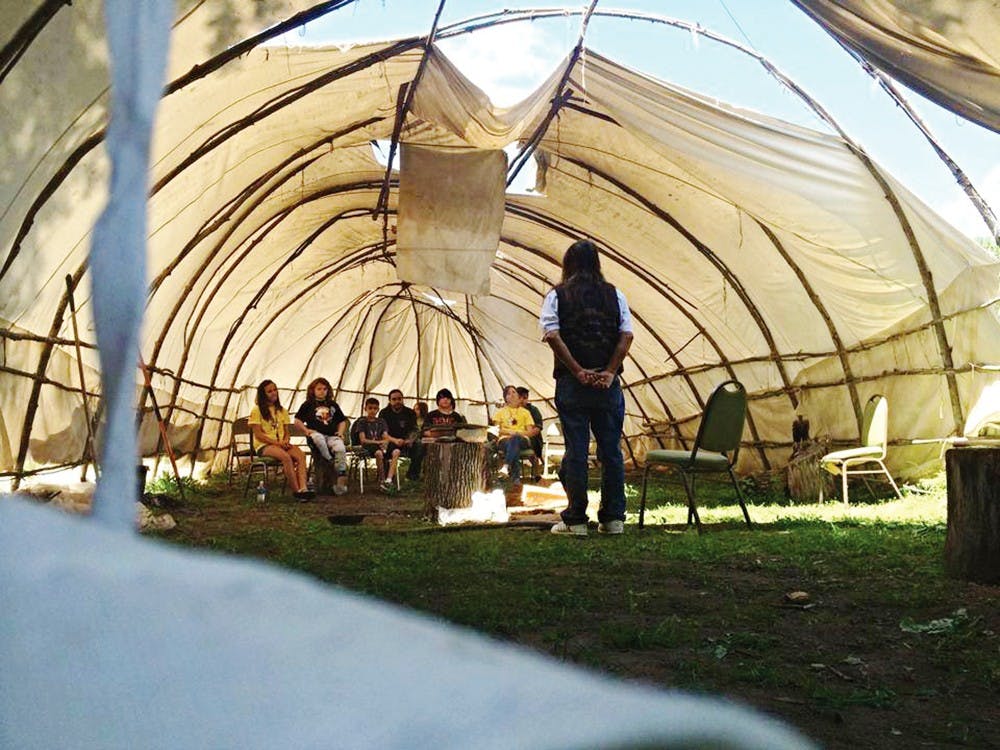Mentor program unites CMU with tribal youth

When David Kinney launched a pilot program for bringing Native American youth and Native American mentors together last year, he was hopeful for the future.
A professor in the Sociology Department at Central Michigan University, Kinney worked for three years developing the mentoring program, called Niijkewehn, which roughly translates to “one I walk with” or “friend.”
“We were looking for a name for the program and were talking to different tribal members and this name kept coming up,” Kinney said.
The mentoring program is a collaboration between CMU and the Saginaw Chippewa Indian Tribe. It introduces Native American college students enrolled at CMU to children at local tribal schools for the duration of the school year and summer.
During last year’s pilot program, 20 mentors were paired with 20 students in two tribal elementary schools and one tribal middle school, Kinney said. Mentors interact with tribal youth members through activities and field trips designed to help them in three core areas.
“It’s really three-pronged,” he said. “It’s cultural first. In our program, that’s the centerpiece.”
In addition to the focus on teaching the youth about their Anishinabe culture, the program engages them in recreational activities to emphasize good health and academic work to help them think about future aspirations. Other mentor programs do not always include a cultural aspect, Kinney said, but he felt it was important to connect the tribal youth with their past.
“For the children, their benefits seem to be increased pride in their culture, increased participation in cultural activities and generally it appears as though they’re developing a stronger connection to school,” Kinney said.
Alysha Machuta, a freshman at Michigan State University, participated in the pilot program as a mentor while she was dual enrolled at CMU as a senior at Mount Pleasant High School.
As a student planning to enter the medical field and a direct descendant of the Saginaw Chippewa Indian Tribe, she said the combination of working with kids and culture was a great part of the program.
Kinney said local support for the program has allowed him to expand it, and he is currently seeking additional funding from either the federal government or a private entity.
Currently, costs to run the program are split evenly between CMU and the Tribe.
“We’ve had increased interest from local schools and parents and educators, and we’re expanding into two more middle schools,” he said. “Our goal would be 100 CMU Native American students and at least 100 Saginaw Chippewa children. With the increased number of schools, we expect an increased number of students.”
Nichole McLachlan, a graduate student at CMU, is the Niijkewehn Mentoring Program coordinator and is in charge of recruiting new mentors and students. She began as a graduate assistant helping write grants and do research. She volunteered to coordinate the program when it looked as though it might be lost.
“In February I had mentioned that I wanted to take over that part of the program so that it wouldn’t go under,” McLachlan said.
She also plans and facilitates all the activities the program provides for the students, including trips around Michigan in the summer.
McLachlan said she is thankful for the opportunity to work with the program, as it feeds into her bachelor’s degree in social work and her journey as a graduate student pursuing a master’s degree in public administration.
“I think mentoring is huge and I’m excited to work with Native American students,” she said. “I think it’s going to be a really good asset to the college students as well as the youth.”
Kinney said Colleen Green, director of Native American Programs, and Hunter Genia, director of the Department of Behavioral Health for the Tribe, were an integral part of getting the program off the ground. University President George Ross also has been supportive of Kinney’s efforts.
“Both the mentors and their protégés benefit,” Kinney said. “The mentors learn more about their own culture. They learn that they can make a positive difference in a young person’s life. Many of them become more interested in careers and professions in which they can make positive contributions to their own tribe.”



